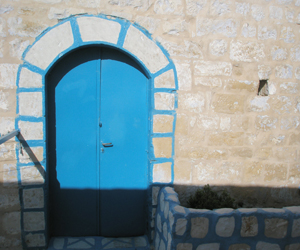Shavuot in Tzfat
Beginnings of the Jewish Nation
After the Exodus from Egypt, the Children of Israel walked towards Mt. Sinai where, 50 days after they fled Egypt, they received the Torah from God.
Remembering this period, Jews today count "the Omer" -- 50 days from the beginning of the Passover holiday until they reach the Shavuot holiday, the holiday when Jews commemorate receiving the Five Books of Moses, the Torah.
The 7 week Omer period is a somber time, when religious Jews traditionally refrain from hearing live music or attending performances, holding large celebrations (including weddings) or even getting haircuts. Each day, during morning prayers, Jews "Count the Omer", saying "this is the third week and the 2nd day (the 23rd day) of the Omer", etc.
Feast of the Pentecost
As the fiftieth day approaches, preparations for Shavuot, also known as the Feast of the Pentecost, begin in earnest. Since Shavuot has few requirements, it's an easy and fun holiday to prepare for.....it's traditional to eat dairy foods on Shavuot (since the Children of Israel are said to have refrained from eating meat until they received the Torah and its laws of kashruth) so during the week preceding Shavuot the dairy counters of the Tzfat supermarkets are crowded, and the workers often find themselves dispensing cooking advice with the cheeses ("try this one, it makes a great quiche").
One Shavuot tradition which is observed throughout the world today has its roots in Tzfat - that of staying up throughout Shavuot night to study Torah. The ARI, the great Kabbalist R' Isaac Luria, began that tradition when he lived in Tzfat in the 16th century, and today it is practiced by Jewish communities worldwide. In Tzfat, children remain with their parents, usually the fathers, for much of the night, wandering home alone when they are ready to go to sleep. The streets are full of people on Shavuot night, moving from synagogue to synagogue, class to class, and no one thinks twice about an 8-year-old who is walking home alone.
One Shavuot law states that everyone is required to hear the Ten Commandments read aloud. Groups of young men walk through Tzfat on Shavuot day, calling to residents who may not have been in a synagogue yet that day, inviting them to come outside and hear the portion read. On streets and lanes throughout the town, little groups gather on street corners and in local parks to hear the readers chant the Ten Commandments. Oftentimes, the readers are called into the homes of people who are confined to their apartments, and they go in joyfully, pleased to help someone fulfill the law of hearing the Ten Commandments read.
Children also look forward to Shavuot for another reason.....Shavuot is the unofficially opening of summer. Throughout the town, children bring their water balloons and water guns to the local parks and public squares as Shavuot water fights break out. Most adults know that this is the time of day to stay inside, but after their nights of learning, they are prepared to hand the streets over to the children, who gleefully enjoy ushering in the summer with their water wars.

